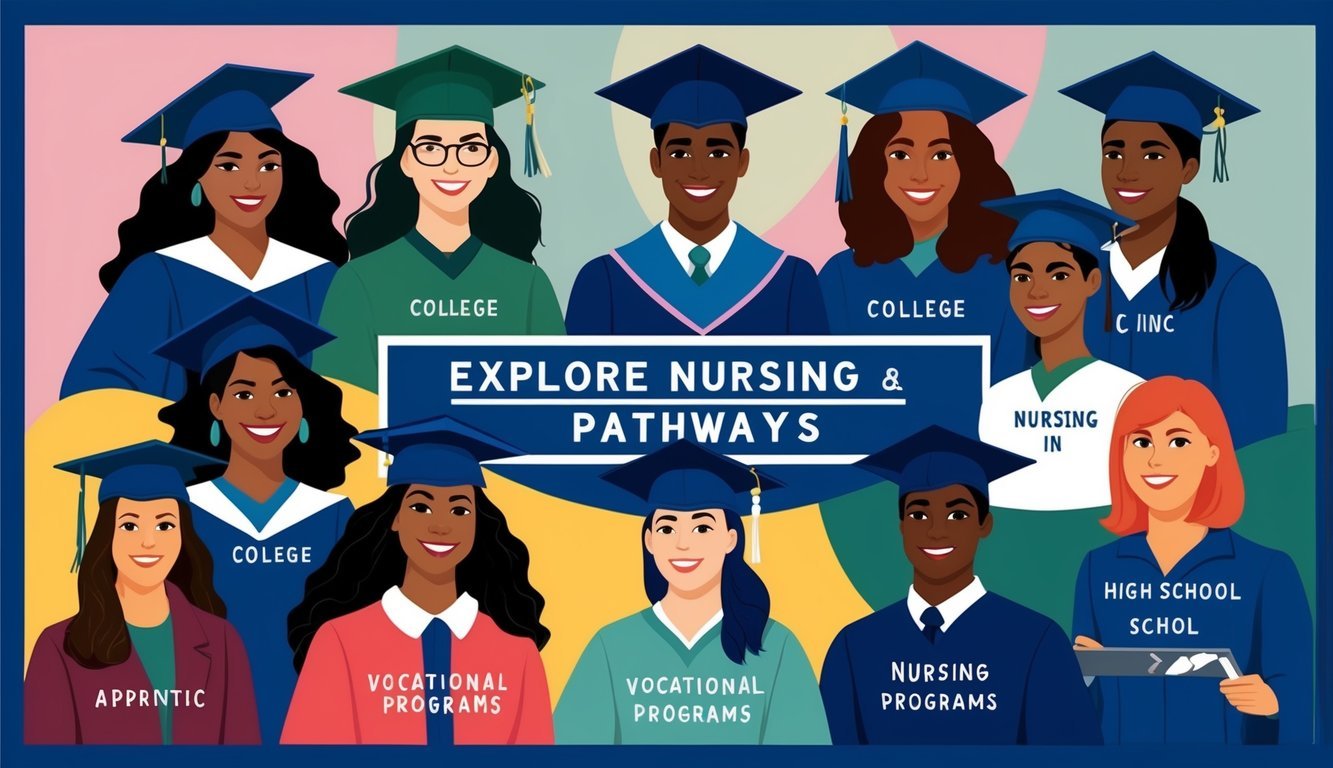Becoming a nurse after high school is a rewarding journey that allows you to make a difference in people’s lives. The steps you take now can set the foundation for a successful career in healthcare, where you can choose from various nursing paths that best fit your interests and goals.
From enrolling in a nursing program to obtaining licensure, understanding the process can help ease your transition into this fulfilling profession.
As a high school graduate, you have several options to pursue nursing.
You can start with a diploma, an associate degree, or a bachelor’s degree in nursing.
Each pathway offers different benefits and leads to distinct career opportunities.
Alongside your education, gaining hands-on experience through volunteering or internships will help you develop the skills needed in real-world settings.
Getting started on your nursing career involves careful planning and dedication.
As you explore different roles within nursing, remember that every step you take enhances your ability to provide care and support to those in need.
Key Takeaways
- You can start your nursing journey by choosing the right educational pathway.
- Hands-on experience is essential in developing your nursing skills.
- Career growth in nursing often includes further education and specialization options.
Understanding the Nursing Profession

Nursing is a critical field within the healthcare system, offering diverse roles and responsibilities.
As you explore this profession, it’s important to know the different specialties available and the opportunities for career advancement.
Roles and Responsibilities
As a nurse, your primary role focuses on patient care.
You will assess patients’ health, administer medications, and assist with daily activities.
Depending on your level of training, you might work as a Licensed Practical Nurse (LPN) or a Registered Nurse (RN).
LPNs typically provide basic care under the supervision of RNs or physicians, while RNs handle more complex tasks, including developing care plans and conducting health assessments. Nursing Assistants help with basic patient needs, ensuring patients are comfortable and well-cared for.
Your responsibilities may include:
- Monitoring vital signs
- Documenting patient information
- Educating patients and families about health management
Nursing Specialties
The nursing profession includes various specialties, allowing you to choose a path that aligns with your interests.
Some common specialties are:
- Pediatrics: Caring for infants and children
- Gerontology: Focusing on aging populations
- Critical Care: Working in emergency or intensive care settings
Advanced Practice Registered Nurses (APRNs), such as Nurse Practitioners (NPs), have specialized training that enables them to diagnose conditions, prescribe medications, and provide comprehensive care.
Each specialty has specific education and certification requirements, so researching your options is essential.
Career Advancement Opportunities
Nursing offers numerous paths for career advancement.
You can pursue further education, such as a Bachelor of Science in Nursing (BSN) or a Master’s degree, which may lead to higher-paying roles.
More advanced roles include:
- Nurse Manager: Overseeing nursing staff and operations
- Clinical Nurse Specialist: Providing expert care in specific areas
- Nurse Educator: Training future nurses in academic settings
Additionally, many nurses choose to specialize in areas such as wound care or oncology, which can open doors to new roles and increase your earning potential.
Keeping up with continuing education and certifications will enhance your skills in this growing field.
Educational Pathways in Nursing

Becoming a nurse requires careful planning and the right educational choices.
Knowing your options can help you make informed decisions about your future in nursing.
High School Preparation
To get ready for a nursing career, focus on specific subjects during high school.
Taking classes in biology, chemistry, and mathematics will give you a strong foundation.
These subjects are essential for understanding nursing concepts later on.
Additionally, consider enrolling in health sciences or advanced placement (AP) classes if they are available.
Volunteering at a healthcare facility, such as a hospital or clinic, will also provide valuable experience and insight into the nursing field.
Taking the SAT or ACT two years prior to graduation can improve your chances when applying to nursing programs.
This preparation sets you up for success in nursing education.
Nursing Degrees Explained
There are several pathways to becoming a nurse, each offering unique degree options.
The most common nursing degrees include:
- Associate Degree in Nursing (ADN): Typically a two-year program that prepares you for the RN role. ADN programs focus on the basics of nursing care.
- Bachelor of Science in Nursing (BSN): Usually a four-year degree that provides a more in-depth education. BSN graduates often have better job prospects and higher earning potential.
For those already holding a degree, RN-to-BSN programs and accelerated BSN options are available.
These can be completed in a shorter time frame or allow you to build on previous education.
Choosing the Right Nursing Program
When choosing a nursing program, make sure it is accredited.
Accreditation ensures that the education you receive meets specific standards, improving your job opportunities after graduation.
You can find a list of accredited nursing programs through the American Association of Colleges of Nursing.
Consider your career goals when selecting a program.
If you aim for advanced roles, look into Master of Science in Nursing (MSN) or Doctor of Nursing Practice (DNP) programs once you obtain your initial nursing degree.
Finally, explore options for online RN-to-BSN programs if flexibility is important to you.
Ensure that the program you choose fits your lifestyle and career aspirations.
Licensure and Certifications

To practice as a nurse, you need to pass certain exams and meet state requirements.
Understanding these processes will help you keep your career on track and ensure you are properly certified to provide quality care.
National Council Licensure Examination (NCLEX)
The NCLEX is a key step for anyone looking to become a registered nurse (RN) or a licensed practical nurse (LPN).
The exam tests your knowledge and skills necessary for safe and effective nursing practice.
- NCLEX-RN: For registered nurses, focusing on critical thinking and decision-making.
- NCLEX-PN: For practical nurses, focusing on basic nursing care.
You must apply to a state board of nursing to take the NCLEX and pay the exam fees.
After you pass, you receive your nursing license.
State Licensure Requirements
Each state has unique licensure requirements, so it’s important to check with your state’s nursing board.
Common requirements include:
- Education: Completion of an accredited nursing program, like an Associate Degree in Nursing (ADN) or a Bachelor of Science in Nursing (BSN).
- Passage of the NCLEX: You must pass the NCLEX exam relevant to your qualifications.
- Background Check: Most states require a criminal background check.
Once all criteria are met, you can apply for your state nursing license.
This license allows you to practice nursing legally within that state.
Specialty Certifications
Once licensed, you can pursue additional nursing certifications in specialties.
These certifications boost your skills and improve job prospects.
Some popular certifications include:
- Certified Pediatric Nurse (CPN)
- Certified Medical-Surgical Registered Nurse (CMSRN)
- Clinical Nurse Specialist (CNS)
To earn these certifications, you often need to pass another exam and meet specific experience requirements.
These certifications demonstrate your expertise in a particular area of nursing and may enhance your career advancement opportunities.
For more details about specific licensing requirements, visit the National Council of State Boards of Nursing.
Gaining Experience and Clinical Skills

Gaining hands-on experience and clinical skills is vital for your nursing career.
This section covers the importance of clinical rotations, entry-level positions, and the continuous learning necessary for nursing practice.
Clinical Rotations and Internships
Clinical rotations are essential as they allow you to apply what you’ve learned in real-world settings.
During these rotations, you will work under the supervision of experienced nurses, which helps you develop critical nursing skills and clinical judgment.
Typically, rotations last several weeks and can vary by nursing specialty.
You will gain experience in areas such as:
- Medical-Surgical Nursing
- Pediatric Nursing
- Gerontology
- Mental Health Nursing
Internships might also be available at healthcare employers, giving you a chance to work in a more structured program and often gain credit toward your degree.
Engaging in these experiences can improve your resume and make you a more competitive candidate for registered nurse (RN) jobs.
Entry-Level Nursing Positions
After completing your education, consider applying for entry-level nursing positions.
Positions such as a Licensed Practical Nurse (LPN) or a Patient Care Technician (PCT) can provide valuable insights into patient care and daily nursing responsibilities.
These roles often require fewer qualifications and allow you to gain practical experience.
They also help you build important relationships with healthcare teams, which can be beneficial for future opportunities.
Additionally, working in these positions helps you understand the workflow of healthcare settings, enhancing your awareness of nursing specialties and pathways available to you.
Continued Learning and Practice
Continued learning is crucial in nursing.
After your initial training, you should seek further education, such as certifications in specific nursing specialties that interest you.
Online courses, workshops, and seminars can help you stay updated on the latest practices and technologies in patient care.
You may also consider volunteering in healthcare settings, which allows for hands-on practice and exposure to diverse patient populations.
Engaging in community health initiatives can further enhance your skills while demonstrating your commitment to the nursing profession.
By continuously seeking education and experience, you will solidify your foundation as a skilled and knowledgeable nurse.
Career Development and Further Education
As you advance in your nursing career, opportunities for professional growth and continued education become crucial.
Enhancing your skill set and credentials can lead to better job prospects and more specialized roles within healthcare.
Professional Organizations and Networking
Joining professional organizations is a smart move for any nurse.
Groups such as the American Nurses Association (ANA) and the National Student Nurses’ Association (NSNA) offer resources like job boards, mentorship programs, and networking opportunities.
Through these organizations, you can attend conferences and workshops, which help you stay updated on industry trends.
Networking can lead to job referrals and collaborations that benefit your career.
Consider participating in local chapter events for more personal connections within your community.
Advanced Degrees and Specializations
Pursuing an advanced degree can open doors to specialized roles.
Options include a Bachelor of Science in Nursing (BSN), Master of Science in Nursing (MSN), and even a Doctor of Nursing Practice (DNP).
Each level of education allows you to expand your expertise.
Specializations like pediatrics, gerontology, and wound care can make you a sought-after candidate for certain positions.
Completing a DNP program can lead to roles in leadership and academia, ultimately fitting your career goals and interests.
Transitioning into Advanced Roles
As you gain experience, consider transitioning into roles such as a Nurse Practitioner (NP) or Advanced Practice Registered Nurse (APRN).
These positions require additional education but can provide greater autonomy and responsibility.
In these advanced roles, you can focus on areas like critical care, emergency room settings, or hospice care.
This transition often involves advanced clinical training and mastering skills for assessing and treating patients.
Embracing this journey allows for a fulfilling and impactful career in nursing.
Frequently Asked Questions
When considering a nursing career after high school, you may have specific questions about requirements, classes, and program options.
Understanding these key points can help guide your decisions moving forward.
What are the requirements to get into nursing school after graduating high school?
To get into nursing school, you usually need a high school diploma or GED.
Additionally, most programs require you to take specific entrance exams or have a certain GPA.
Some schools may also look for volunteer or work experience in a healthcare setting.
How long does it take to become a registered nurse after completing high school?
Typically, it takes two to four years to become a registered nurse (RN) after high school.
If you pursue an Associate Degree in Nursing (ADN), it usually takes two years.
A Bachelor of Science in Nursing (BSN) generally takes four years to complete.
What high school classes should I take to best prepare for a nursing career?
To prepare for a nursing career, focus on courses in math, biology, chemistry, and health sciences.
Advanced Placement (AP) classes in these subjects can also be helpful.
Additionally, consider taking courses in psychology and communication, as these skills are essential in nursing.
Are there any nursing programs available to high school students?
Yes, some nursing programs are designed specifically for high school students.
These can include dual enrollment programs that allow you to earn college credits while still in high school.
Some schools may also offer practical nursing assistant courses.
Can I enroll in online nursing programs while still in high school?
Some online nursing programs allow high school students to enroll, but requirements can vary.
Make sure to check the specific program’s age and education requirements.
Also, ensure the program is accredited to meet necessary nursing education standards.
What is the minimum age requirement to start training as a nurse?
Some nursing positions, like a Licensed Nursing Assistant (LNA), may require you to be 16 or older to start training.
However, for more advanced nursing roles, you typically need to be 18 when you begin your nursing program. Check your state’s specific requirements to be sure.

